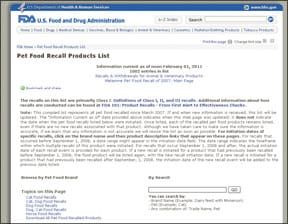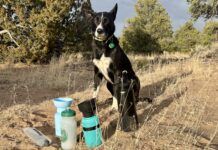[Updated November 3, 2017]
Over the past few years, owners have become uncomfortably aware that their pets’ food can be suddenly declared dangerous, due to contamination of the product or its ingredients or some sort of processing malfunction. What should you do if you learn about a recall of your dog’s food?
Not sure how dog food recalls works? Check out this Dogster report.

1. Check the brand, variety, package size, and lot numbers.
If you hear about a recall of food involving a company whose products you recently fed your dog, you need to do some further (and fast) research. The best source of information is the Food and Drug Administration’s website, where recalls are announced. That’s unfortunate for those of you who don’t use a computer. You can call the FDA, but it might be difficult to get through, especially if the recall was extensive. The goal is to determine whether the product you have in your possession is truly involved in the recall. You’ll need to compare the variety, package size, and lot numbers of the recalled food.
This is why we recommend that owners always keep their pets’ dry food in its original bag. There are a number of problems that can arise from dumping dry dog food into another container; not having the package (and lot numbers) in case of a recall is a big one.
Not long ago, I a brand of food I was currently feeding my dog was recalled. It turned out that I had the same brand and variety as one that was recalled, but the bag size and lot numbers were different. I put that food aside for another few weeks until I was certain that the recall didn’t expand to include the lot I had.
2. Stop feeding the recalled food.
If you determine that you do have possession of the product being recalled, don’t feed any more of it to your dog! You may even do as I did and hold off feeding a product that is the same brand and variety, but a different size or lot number, until the involved parties (pet food company, FDA) are certain they have identified all the affected product. Buy another product to feed your dog for now.
Also, don’t throw the recalled food away, but keep it in a place where it can’t be eaten or accidently fed to your dog.
3. Check your dog for signs of illness.
Your urgency on this point should be congruent with the reason for the recall. If the recall was caused by the discovery of Salmonella on your dog’s food, and he hasn’t had diarrhea since eating the food, there is little cause for concern; most dogs can handle a little brush with Salmonella.
However, if the recall was due to a more serious threat, such as such as aflatoxin (a toxin produced by fungus) or a dangerous excess of a potentially toxic nutrient, such as vitamin D or copper, you might want to schedule a veterinary examination. If your dog’s health has been sketchy, or you’ve noticed any change in his well-being or activity since feeding the food, ask your vet for an immediate appointment.
4. Contact the food’s maker.
It may be difficult to get through to the pet food company’s toll-free number, but persevere. If given the opportunity to leave a message, speak slowly and clearly, and give your name, phone number/s, mailing address, and e-mail address. Keep the dog food package near the phone, so you can confirm the brand, variety, size, and lot number to the representative. Inform the company how much recalled food you have, how much you have left, and what condition your dog is in (seemingly fine? not quite right? seriously ill?). Ask what they will do next, and what you should do with the product that you have left over. They may ask you to send some of the food to them for testing; don’t send all of it.
5. Follow through with the pet food company.
If your dog becomes ill after eating a recalled food, follow through. The manufacturer has a legal obligation to report adverse affects caused by their products, but it might not be easily convinced of its culpability. Go ahead and file a report with the FDA; there is a simple (but long) form for this purpose online. Keep assiduous records of your dog’s ongoing health issues and save your veterinary receipts. Keep the pet food bag and the receipt for the food (if you have it). Send copies of these things if requested, but don’t lose the originals. Stay in constant contact with the pet food company until you have been reimbursed for the food and for any vet bills you’ve had to pay.
Nancy Kerns is Editor of WDJ.






